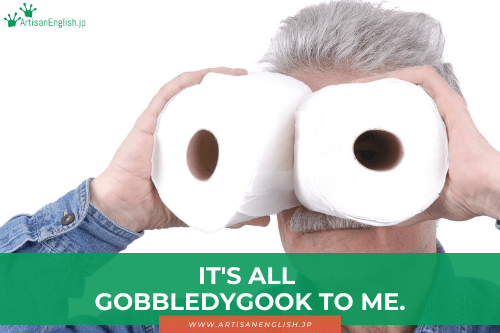
YouTube / iTunes / Spotify / Radio Public / Pocket Casts / Google Podcasts / Breaker / Overcast
Listen to ArtisanEnglish.jp posts & lesson intros here.
WotD: Gobbledygook
Dr. Doolittle was a doctor who preferred to treat animals because he could talk to them in their own language.
Now, I am going to introduce you to the word gobbledygook.
I will also forgive you if you think this is the language spoken by turkeys – gobble, gobble, gobble.
Even though gobbledygook is a language, it is not spoken by turkeys; it’s spoken by bureaucrats and may be better known to you as bureaucratese.
Gobbledygook often sounds like incomprehensible nonsense to ordinary people.
In reality, the pompous jargon of specialists sounds important and official but is unnecessarily difficult to understand.
These are words and phrases we often hear but don’t really understand what they mean.
Think about official statements from the government, instruction manuals or investment advice from professionals, and you will bring to mind examples of gobbledygook.
Like or follow ArtisanEnglish.jp on social media.
Let’s look at a few examples.
We’ll begin with the term world-class.
If I told you I wanted to turn ArtisanEnglish.jp into a world-class company, what would that mean?
Come on, when you hear world-class, what do you envision?
The best, OK, but the best at what?
The term world-class is gobbledygook because it doesn’t say anything.
There is no information behind it.
Here’s an example of gobbledygook I found online.
…..
INSERT COMPANY NAME HERE is pleased to announce innovative solutions for new and improved, next-generation, cost-effective, world-class, high-performance, value-added outcomes.
…..
On first impression, it may sound very informative and powerful to you.
It’s the kind of language that is impressive.
However, the words carry no meaning and no weight.
It’s gobbledygook.
Flesch-Kincaid Readability Test
This post is understandable by someone with at least a 9th-grade education (age 15).
On the Flesch-Kincaid reading-ease test, this post scores 58.
The easier a passage is to read, the higher the score on a scale of 0 – 100.

